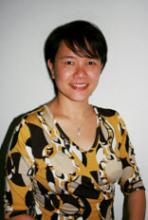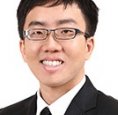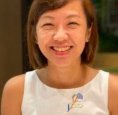In the spotlight is an initiative by PSS that features pharmacists who excel in their area of practice and have been role models for fellow pharmacists. In this issue, we feature:

Dr. Camilla Wong obtained her Bachelor of Pharmacy degree from the Curtin University of Technology, Australia in 1992 and subsequently a Doctor of Pharmacy (Pharm D) from the Albany College of Pharmacy, USA in 2001.
Currently, Dr Camilla Wong is the Deputy Director of the Allied Health Division at Singapore General Hospital (SGH). In addition to being the overall in-charge of clinical pharmacy Services at SGH, she holds the portfolio for Clinical Governance of the Allied Health Division. Dr. Wong sits on numerous SGH committees, including the ICU, Career Advancement Workgroup, Clinical Privileging and Competency, and Clinical Governance committees. She has also been appointed to the SingHealth Clinical Quality Directors Group and to the Pharmacy Specialist Accreditation Board Pro Tem Committee. Despite her busy schedule, Dr Wong still provides clinical services at the Neuroscience ICU.
Dr. Wong is very passionate about training and education for pharmacists. She spends the bulk of her time planning and developing frameworks and programmes for pharmacists and other allied health professionals.
With her numerous accomplishments, Dr Wong is a role model for many pharmacists. She served as the president of the Pharmaceutical Society of Singapore from 2003-2005. In 2006, Dr Wong was awarded the Professor Lucy Wan, Outstanding Pharmacist of the Year Award. Dr. Wong was the first Singapore pharmacist to receive the FAPA Ishidate Award for hospital pharmacy at the 2008 Federation of Asian Pharmaceutical Associations Congress, at which she was also the Chairperson of the organizing committee.
What others say about Dr Camilla Wong
Camilla has excellent interpersonal skills and relates well with all levels of staff and others outside SGH. Sincere and caring towards others, she is a great colleague and friend!
Camilla is optimistic and has the ability to·criticize constructively and harmonize tense situations.· She never lets any hurdle stops her in pushing the profession forward.
Camilla is dedicated, full of vision and always inspires others to do better.
She is a great leader with a clear vision and she always encourages pharmacy staff to excel in the things they do. She is passionate about her career and full of energy to push for clinical services in pharmacy and the allied health services.
An Interview with Dr Camilla Wong
A. What would your advice be for the younger pharmacists, especially when faced with challenges?
Be willing to learn all aspects of pharmacy practice...even the most mundane things. Many young pharmacists want to be clinical & tend to find it unnecessary to learn the technical / operational aspects of the job. However, having sound knowledge in the latter is just as important & helps to develop skills that you would not receive with just clinical knowledge.
Throughout your life, challenges will come in many forms including personal development, interpersonal conflicts, managing your supervisors & bosses, ensuring work-life balance, situations requiring ethical/professional considerations and health matters. When faced with challenges, do not give up easily & always have a positive outlook even if you don't see an immediate solution. Remember that sometimes, it takes a while (even years) to overcome a challenge.
B. What helped / motivated you to be where you are today?
In my first year as a pharmacist busily dispensing drugs at our outpatient pharmacy, I received a thank you note from a cardiac patient. An excerpt from it reads, "I walked away, less fearful, more hopeful and a little joyful – and with some faith. Thank you for all the good things.” Until then, I had not realized the impact of my professional duties on patients, just by going about my daily routine at work. We often get fixated on executing our responsibilities with such capability and efficiency that we forget to be kind and compassionate to others. With sickness and death being the cold hard facts of working in a hospital, I am constantly being reminded about how fragile life can be. The death of a familiar patient moves me deeply, as does the recovery of a long-suffering patient. I feel as my patients feel and it is this passion for people and how I make a difference in their health that spurs me on in my daily responsibilities. The joy of seeing a patient going home better than when he first entered the hospital is something I cherish everyday.
C. Who would you say is your role model, whom inspired you to excel in the pharmacy field that you chose?
Our Chief Pharmacist Ms Ang Hui Gek has been a great role model to me. She has guided and provided numerous opportunities for me to excel in my pharmacy career. Our relationship has transcended from Hui Gek being a boss, to a colleague whom I can plan the pharmacy profession's services and development, and to a good friend whom I can always seek advice and exchange ideas with.
D. What is the most memorable moment in your pharmacy career?
- Winning 1st prize at the PSS Annual Pharmacy Congress in 1996 as this was the first research project of my career.
- Starting rounds with the cardiac team and providing therapeutic drug monitoring services to inpatients in 1996 as these were a step up from the routine review of inpatient medication records.
- Completing my Pharm D and critical care residency between 1999 and 2002.
- Educating and training pharmacy students, pre-registration pharmacists and pharmacists who eventually become pharmacy leaders in the various fields of pharmacy.
- Being President of the Pharmaceutical Society of Singapore at the age of 32 was challenging for me with a steep learning curve and being new to motherhood at the same time!
- Being Chairperson of the Federation of Asian Pharmaceutical Association (FAPA) Congress that was held in Singapore in 2008. The opportunity to network with pharmacists beyond Singapore was certainly an experience. Also, winning the FAPA Ishidate Award for hospital pharmacy was memorable not just for me personally but for Singapore as we continue to lead the region in the provision of clinical pharmacy services.
- Developing and implementing a new career pathway and competency framework for SGH/Singhealth pharmacists.
- To be appointed in hospital, organizational and national committees etc that see, the value of having a pharmacist on their team.
E. Describe your career progression path.
I started out my career as a pre-registration pharmacist in a busy suburban retail pharmacy in Australia. It was certainly a good learning opportunity for me and allowed me to understand and appreciate the dynamics of a pharmacist providing professional services in the midst of running a business. Upon my return to Singapore, I obtained a position at SGH, and have been there since. I started out at the outpatient pharmacy and then after a year, was sent to help set up the National Heart Centre pharmacy (which was still part of SGH at that time). To build a pharmacy from scratch was not easy and I thoroughly enjoyed the experience. It was also around this time that I started rounding with the cardiac medical team at the inpatient setting.
After having spent the initial years of my career in the outpatient setting, I had a strong desire to move into the inpatient setting and started providing inpatient services including rounding with the cardiac medical team and providing therapeutic drug monitoring services. We set up warfarin counseling services both at the inpatient and outpatient settings which included pharmacists making recommendations on dosages etc. Then in 1996 I was given the opportunity to be trained at the University of California San Francisco Medical Centre and San Francisco General Hospital, in this area. It was certainly an eye opener for me as I was also attached to a family practice clinic whereby the pharmacists ran clinical services for an array of conditions and diseases. It was then that I realized the breath and depth of clinical services that our Singapore pharmacists could provide.
In 1998, I was given the opportunity to complete a 2-year post graduate Pharm D programme at the Albany College of Pharmacy in the US. With a year of didactic education and a full-year of clerkship attachments, I jumped at the opportunity as I had learnt so much in the short 1-month stint at UCSF & SFGH, what more a whole year of attachment!
Towards the end of my Pharm D programme, I realized the value of completing a specialty residency programme and with the “blessing” of SGH, embarked on a critical care residency training programme at Clarian Health Partners, Indianapolis, under the supervision of Dr Judith Jacobi (who was appointed the first pharmacist to be president of the Society of Critical Care Medicine this year).
I finally returned to Singapore in 2002 and started my career as a full-time clinical pharmacist, providing care at the various ICUs within SGH. Over the years I was promoted to a senior principal clinical pharmacist position.
Then in 2007, I took on the Deputy Head of Pharmacy position as I came to realize how I could better influence and guide the profession in this new capacity. And as I progressively got more involved in hospital-level issues and committees, I felt a calling to move into an even more administrative position i.e. as Deputy Director of the Allied Health Division. My portfolio now includes clinical governance of the Division and being overall in-charge of clinical pharmacy services.
Nowadays, I still provide clinical services at the Neuroscience ICU but spend the bulk of my time planning and developing frameworks and programmes for pharmacists and other allied health professionals. While I am actually losing more of my clinical practice, I have always felt that I could either be that ICU pharmacist managing those few patients a day or that administrator leading a team of not just pharmacists but other allied health professionals, managing 1600 hospital beds and thousands of outpatients.



